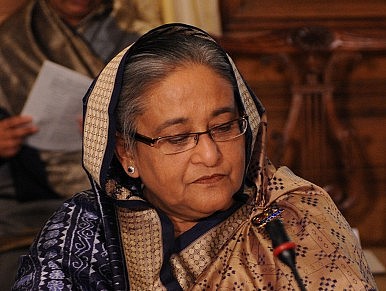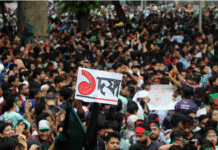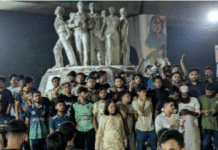The country needs to combine stability with economic growth. It won’t be easy.
Bangladesh continues to be haunted by its bloody past. The boycott of the major opposition party and its allies of the recent elections has created a delicate situation. The election outcome falls short of reassuring the global community that Bangladesh is firmly on its way to a free and stable society. A look back at the country’s past offers a few clues to the uncertainty that clouds the nation.
Jamaat-e-Islami, a radical Islamist party, has long been accused of being an active participant in the violence that the country experienced during its liberation in 1971. Among those Jamaat leaders who attained demonic status in the killings of three million people was the man who has earned the epithet of “Butcher of Mirpur”: Abdul Quader Mollah. Post-independence, Jamaat has never been popular enough to wrest political power on its own; however, it has done so in an alliance with the Begum Khaleda Zia-led Bangladesh Nationalist Party (BNP) governments during its years in government from 1991-1996 and 2001–2006.
During Khalida’s second tenure as prime minister, extremism became more entrenched in Bangladesh. Its spread was cause for alarm for the country’s neighbours, worried about terrorist networks permeating through their long and largely porous mutual borders.
Towards the end of Begum Khalida’s second tenure, with the situation becoming critical, the Bangladesh Army intervened by installing a caretaker government in January 2007. Two years later, in a return to parliamentary democracy, the Awami League won a landslide victory in the December 2008 elections. One of its campaign pledges was to try those charged with genocide during the liberation war. Those 2008 elections demonstrated Jamaat’s unpopularity: it won only five of the 300 parliamentary seats up for grabs.
On taking over as Prime Minister, Sheikh Hasina, the Awami League leader, formed an International Crimes Tribunal to try those accused of crimes during the 1971 liberation war. In doing so, she received offers of support from the UN and the European Union. The tribunal has so far sentenced Abdul Quader Mollah, along with ten other leaders of Jamaat e Islami and BNP. Mollah’s original sentence of life imprisonment was contested under the provisions of a new law enacted by the Bangladesh government, and he was sentenced to be hanged by the Bangladesh Supreme Court.
That sentence was carried out by the Awami League government on December 12, 2013, against the advice given by a number of heads of state. Hasina was able to control the expected violence that followed in the wake of Mollah’s hanging, but the global community remains disconcerted.
Though Hasina’s pivotal role in preventing Bangladesh from becoming another preferred home for global Jihad is acknowledged by most of the free world, the troubles that attended the January 2014 elections creates a difficult situation. The boycotts meant that 154 of the 300 National Assembly seats went uncontested. Further, unlike National Assembly elections since 1991, no caretaker government had been formed to conduct the elections – the relevant constitutional provision was scrapped by Hasina’s majority government in 2011. As a result, the National Assembly in place today is a questionable representative body. The poor turnout for the elections is another dent in its image.
Meanwhile, the BNP’s continued association with Jamaat-e-Islami and its questionable role in dealing with terrorist outfits during its time in power raises hackles for most democracies.
Notwithstanding the rather tenuous situation, even as the global community gropes for answers, it would be wise to acknowledge the fact that Hasina has ably stalled the growth of terrorist organizations in Bangladesh. Further, the fact that she was able to control the violent backlash expected following Mollah’s hanging should suggest some confidence in her ability to maintain stability is warranted.
Nonetheless she faces some serious challenges. Ordinary Bangladeshi citizens in this densely populated country are interested in living peacefully and creating a better future for their children. Political power alone will not be adequate for Hasina to maintain stability; she will also need a growing economy that distributes the dividends of growth more evenly. Ultimately, good governance counts. Bringing infamous criminals to book, though certainly important, is not enough on its own. If Bangladesh’s economic growth model alleviated poverty, the fight against terror would be more comprehensive.
The other institution that has the potential to shape the Bangladesh road map is the army. It displayed admirable prudence when it allowed democratic systems to the fore in 2008. Given its long tenures in power, it is reasonable to wonder if the institution is prepared to remain completely non-interventionist. However, keeping the military men in their barracks is not just the responsibility of the generals; Hasina must help by maintaining stability.
Hasina’s challenges include strengthening democracy while fighting radical elements relentlessly. It also involves acceptance by the global community of the means she employs to carry on with the battle. The stresses will be felt as Bangladesh attempts to continue its fight against terror. The battle will need to be relentlessly waged while being fair, non-vindictive and upholding democratic values. Simultaneously, Bangladesh’s state institutions, which uphold its democratic culture, must grow in strength.
There is need for the global community to take a greater interest in Bangladesh without becoming dictatorial. The country requires both foreign aid and investment. It also requires assistance in terms of intelligence, equipment and training in fighting terror. This is an area where neighboring India could definitely play a larger role. Taking on the extremist groups that operate along their mutual border areas and coordinating operations would certainly enhance the success rates for both sides.
Ideally, Hasina would lead the nation with an indisputable mandate. Begum Khalida would severe her ties with Jamaat and join the democratic process. The country’s armed forces would remain the strength of its democratic political system. The International Tribunal would carry on and issue deterrent punishments. The global community would assist in the growth of Bangladesh’s economy. All the while, stability would remain the prime concern.
Like so many other troubled democracies, Bangladesh has to find the strength to fight terror without diluting the freedom and safeguards that it gives its citizens. The nation must pull itself out of its turbulent past and begin to focus on fulfilling the aspirations of its people in an inclusive society.
Source: The Diplomat










